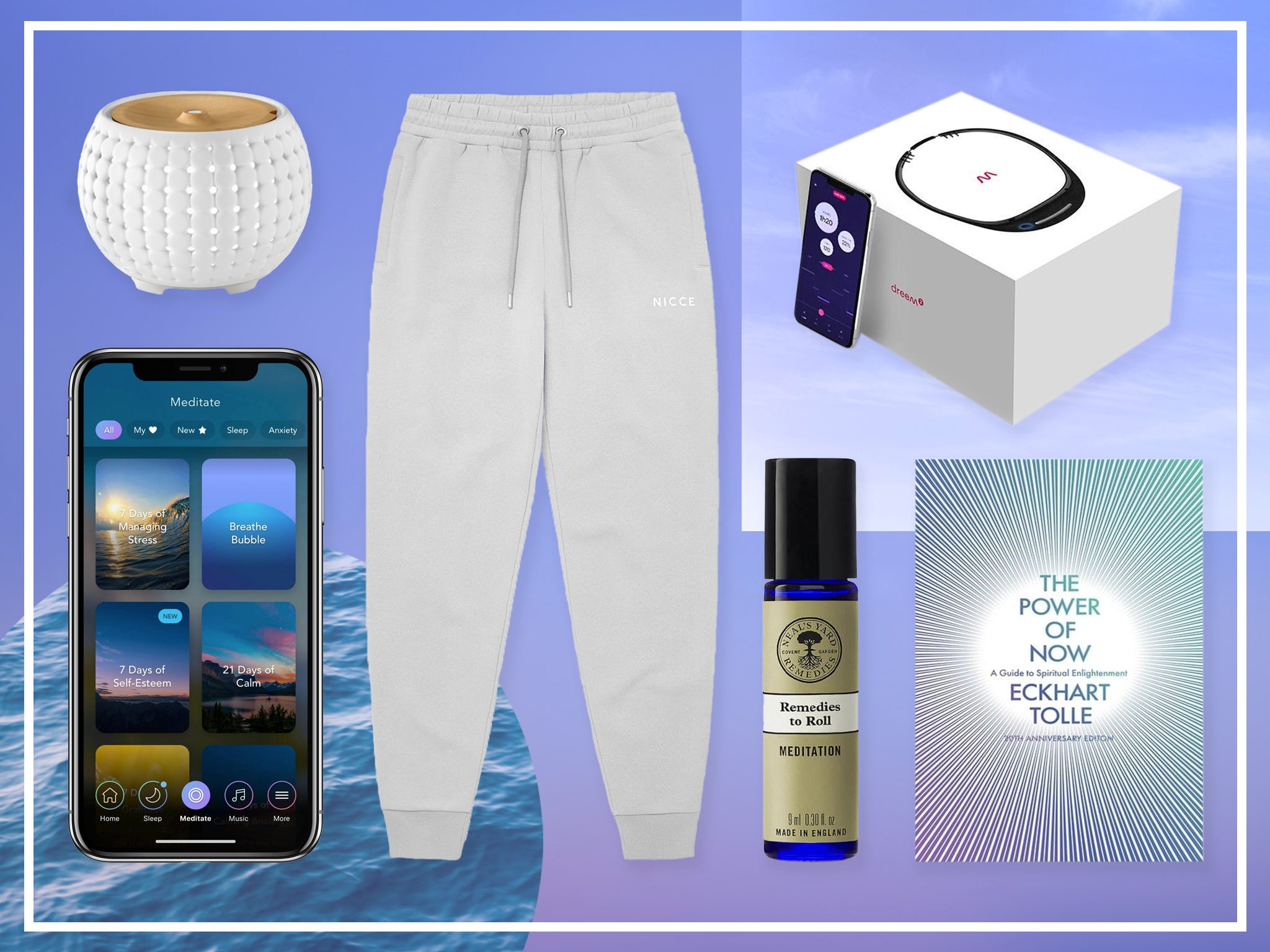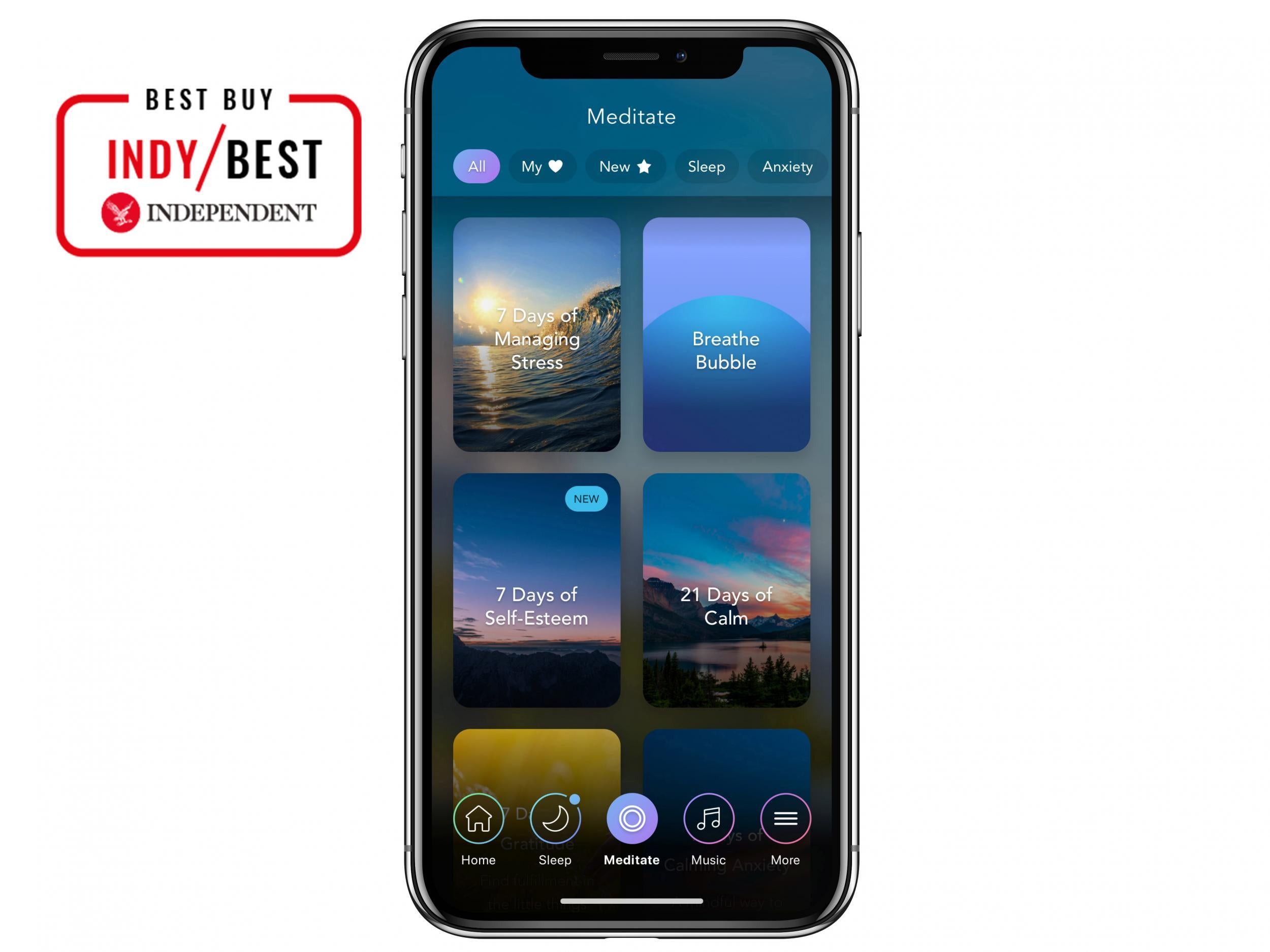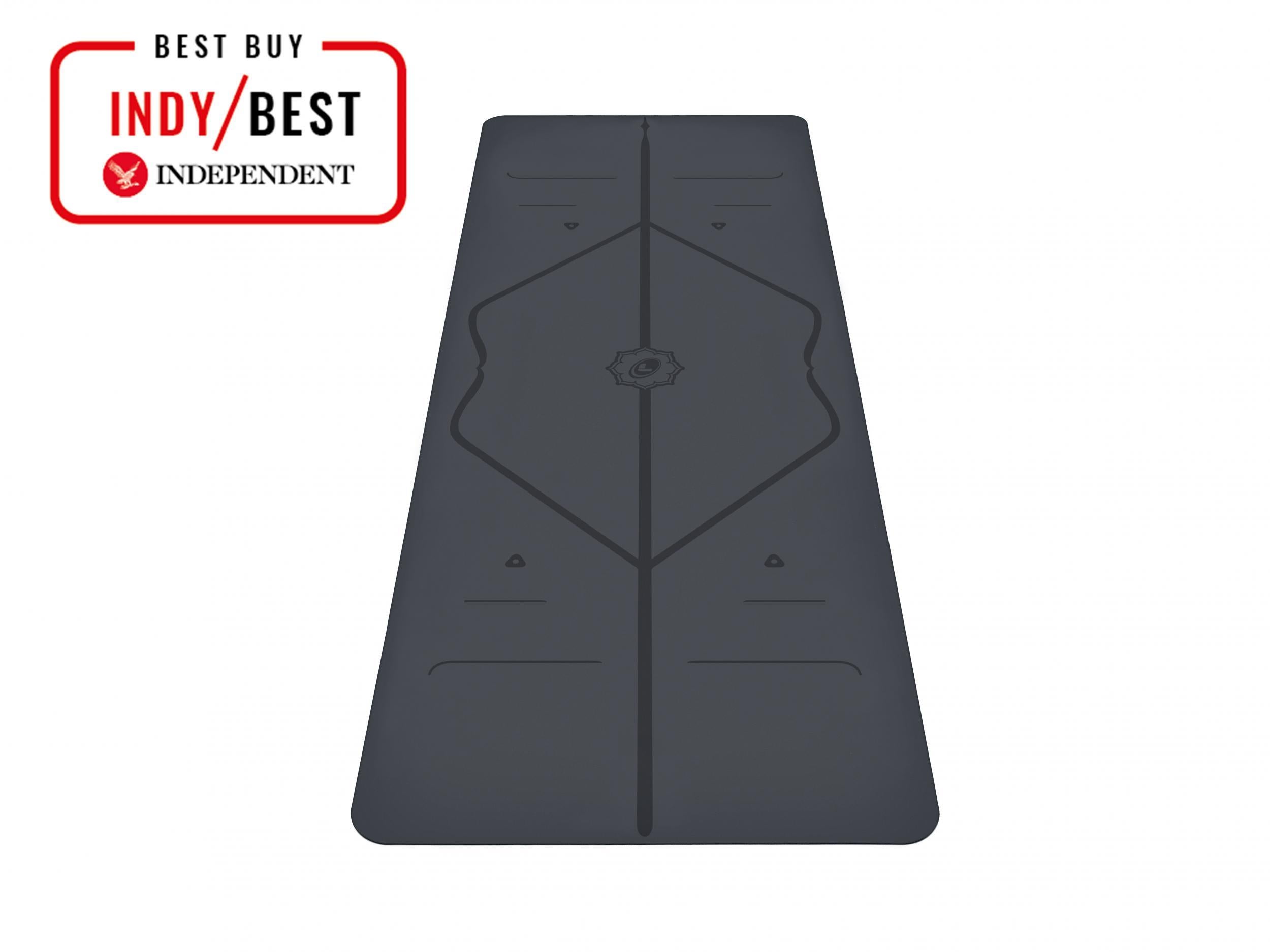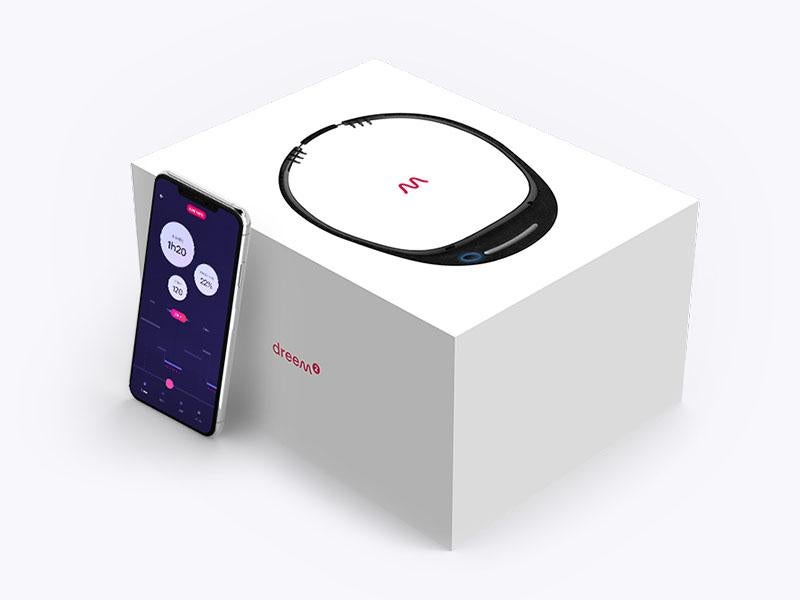The Independent's journalism is supported by our readers. When you purchase through links on our site, we may earn commission. Why trust us?
Meditation at home: Everything you need for mindful reflection in 2021
Whether you’re new to it or a seasoned pro, here are our top tools to help you relax

A new year may have dawned, but for many restrictions remain in place due to the coronavirus pandemic. Whichever lockdown you find yourself in, there’s no getting away from the fact that life is pretty tough right now.
Covid-19 has affected our closest relationships and our leisure time. The things we do to relax, unwind and socialise have been restricted, while working from home, as many of us are, means there’s less separation between the working day and evening rest.
Unsurprisingly, all of these big changes have taken their toll on our mental health. A recent report by mental health charity Mind states that more than half of adults and over two thirds of young people said that their mental health got worse during the first period of lockdown restrictions, from early April to mid-May 2020.
These hard times have inspired a new focus on mental wellbeing. As previously reported by The Independent, the benefits of meditation on mental wellbeing have been explored in various scientific studies over the years, with recent research revealing that mindfulness can also be effective for easing chronic pain.
And there seems to be no slowing the amount of meditation and mindfulness products and guides available to assist in such difficult times. Netflix, for example, has just added a new animated series all about meditation to its service called Headspace Guide to Meditation.
Michael Miller, founder of London Meditation Centre and the New York Meditation Center, says: “It was clear before Covid that people needed meditation and the benefits it brings. And the intense experience of the last 10 months makes it undeniable. We all need a way to turn inwards to find calm and balance and then take that into the world around us.”
Miller adds that the best way to learn to meditate is in person, but that it’s definitely better to do something than nothing. He thinks apps and books can certainly go some way to helping if you want to begin meditating at home.
Emma Mills, author of Inhale, Exhale, Repeat, echoes Miller. “Learning to meditate at home is a hugely worthwhile time investment,” she says. “By meditating, even for just a few minutes each day, you create order in your mind and this enhances the way you perform in your work and family responsibilities and increases your overall capacity for joy.”
A simple meditation to get you started
For those of you who have no idea where to start, Miller has provided this easy-to-follow guide to help focus your mind and get into a meditative mood.
Find somewhere quiet, where, if possible, you can be alone, and go through these steps one by one.
- Sit easily, close the eyes and take a moment to get comfortable.
- Bring your attention to sensations in the body.
- Somewhere in the body there will be a dominant sensation. It can be anything: tightness in the chest; a tingle on top of the head; even an itch in the great left toe.
- Gently bring the attention to that sensation. There is no need to concentrate or focus, simply let the attention lightly rest there.
- After a moment, that sensation will start to shift and dissolve and another sensation will become primary.
- Let the attention move to this new sensation and locale in the body: a twinge in the hip from yesterday’s exercise; a tightness in the back of the neck; or a feeling of lightness in the stomach.
- Again after a few moments this will begin to dissipate and another part of the body will draw your attention. Continue in just the same way.
- After just a few minutes, you’ll naturally find yourself thinking other thoughts easily, almost a sense of daydreaming. Open the eyes slowly.
If this helped but you’d like more guidance, there are plenty of tools at your disposal to help you on your meditation journey.
There are many meditation and mindfulness apps available, while accessories such as yoga mats, comfortable clothes and relaxing candles can help you get into a comfortable meditation routine. If you’re feeling overwhelmed, stressed and anxious, or just need some peace and quiet, here’s how to get started.
You can trust our independent round-ups. We may earn commission from some of the retailers, but we never allow this to influence selections. This revenue helps us to fund journalism across The Independent.
Download a meditation app
A mindfulness app can help you switch off and unwind, particularly if you’re feeling anxious. Many don’t even require you to be looking at a screen while you do it.
When searching to find the right app, it’s worth thinking about what you need as well as what you like. If you can’t stand the narrator’s voice, for instance, then you’re going to find it hard to relax.
In our IndyBest round-up of the best mindfulness apps, we tested a mix of free and paid-for apps all promising to soothe stressed minds. The Calm app came out on top (free for a one-week trial, then £28.99 a year), which you can download for iOS here and download for Android here.
As soon as you open the Calm app, you’re greeted with the soothing sounds of the outdoors. As well as guided “daily calm” sessions that help you unwind and refocus your attention, there are also programmes for intermediate and advanced users.

If you fancy something a little different, you can pick from exclusive music tracks engineered to help you focus, relax or sleep, such as calm body – a series of 10-minute guided videos on mindful movement – and sleep stories, which are tales narrated by celebrities including Stephen Fry and Matthew McConaughey.
With plenty of content for just £28.99 per year (there’s no monthly offer), we also think this app is great value.
Just Breathe is a free alternative that offers guided meditation with a teacher, music or timer in two-, eight- or 20-minute sessions. It’s simple to use, easy to follow and it won’t take long before it becomes part of your routine. Download it here for iOS and here for Android.
And finally, the Meditation Centre’s Miller recommends Insight Timer, partly because there is so much on it, including lots of guided meditations, but also because it features a community aspect. Insight Timer lets you connect with people nearby who are meditating at the same time, giving the feeling that you are sharing the experience with others.
Also landing a spot in our review of the best mindfulness apps, our tester said: “Insight Timer says it’s the world's most popular meditation timer, with a free library of guided meditations at 30,000 and counting. These range from beginners’ flows to sessions focused on self-love, better relationships and conquering addictions."
“It’s a great app with lots of content – but it can be daunting for a beginner. We recommend sticking with it, though, if you’re willing to put the time in to find out what really works for you,” they added.
Soothing candles
Lighting a candle with a relaxing scent can help you calm down before drifting off to sleep, or simply make your environment calm and serene in preparation for meditation. And now the UK is back in lockdown, it’s also the perfect opportunity to light that luxury candle you may have been saving.

Designed to fill your chosen chill-out space with a different calming fragrance each day, you can choose from the energising lemongrass scent of “gratitude”, the soothing lavender of “peace”, the sweet geranium of “love” or the earthy patchouli of “trust”.
All of Pure Thoughts’s candles are handmade in Derbyshire in small batches using vegan-friendly soy wax, cotton wicks and pure essential oils. Our reviewer found each one burned cleanly for 18 hours, and threw its scent well for its size.
The Jo Loves pomelo candle (Jo Loves, £55) is an indulgent treat too, that when lit will transport you to sunny beaches and tranquil blue skies with its blend of grapefruit, vetiver and pink pomelo.

Better yet, if you have a friend who is struggling to switch off, why not give them a candle to help them introduce a bit of calm to their days? Especially if they're a parent juggling homeschooling and work, or are looking after a vulnerable family member.
Yoga mats
Yoga and meditation are entwined, so if you already practice yoga, you'll most likely be halfway there when it comes to meditating.
One of the hardest parts of meditating is keeping still and sitting, or lying, in one place and being comfortable – so a mat will help.
Topping our IndyBest guide was the Liforme yoga mat (Liforme, £100) which had a grippy surface to stop you sliding around your floors and is right in the thickness sweet spot at 4.2mm.
What makes it so unique, though, is the grid designed to help you align yourself in poses without the help of a teacher. The lines are very slightly textured and they do take a bit of getting used to – particularly if you have a set shape for downward dog, for example – but it’s worth playing with.

And if you don't already do yoga, it can certainly help with feeling more calm. Regular exercise can be a great stress reliever, mood booster and aid in helping you sleep better, which is exactly what we all need in these uncertain times. With just a mat, you can turn a room or corridor into your workout space.
If you’re new to yoga, try following a session with Yoga With Adriene, one of the biggest yoga YouTube channels, fronted by instructor Adriene Mishler. She leads free, straightforward sessions on her channel for her six million subscribers, with challenges such as “30 days of yoga” or poses for specific needs like chronic pain or cramps. You’ll also find simple poses to imitate posted on her Instagram too.
Comfortable clothes
You won’t necessarily be doing lots of moving and stretching while you meditate, but you’ll still want to feel comfortable and relaxed in whatever you’re wearing.
Clothes designed for yoga are a good option as they fuss-free and loose. We especially like this loose T-shirt (£20, Sundried), which made our round-up of the best yoga tops of 2020.
Our reviewer found it really comfortable, saying: “We found ourselves lounging around in it on more than one occasion, so if you're looking for a yoga top that will take you from the mat to the sofa, then this is surely the one.”
If you’re looking for bottoms, loose joggers will keep you warm and feeling relaxed. These original logo joggers (Nicce, £40) made into our rundown of the best women’s joggers of 2020.
Our tester noted: “Thick and cosy with a soft, cotton fleece lining, they are the bulkiest pair in our selection but also the warmest and still offer plenty of flexibility.”
Books
If you’re looking for a classic book to help you meditate, Miller recommends Eckhart Tolle’s The Power Of Now (£8.65, Wordery).
Tolle is a self-described spiritual leader who has travelled the world lecturing on surrendering to the present. He says The Power of Now expresses the “essence” of all his work, encouraging the reader to remember the importance of the current moment.
For a newer recommendation, Miller suggests Jillian Lavender’s Why Meditate? Because it Works (£12.99, pre-order on Amazon). Lavender is co-director of the London and New York Meditation Centres, and has written this book to remind readers why it’s so vital to find time in your busy day to meditate.
If you think you’re more in need of a how-to book, then Mills suggests her own: Inhale, Exhale, Repeat (£7.99, Blackwells). She describes it as a “meditation handbook for every part of your day" that includes activities for during housework, gardening, bath time, bedtime, work meetings, creative work, breakfast, lunch and evenings in. There are even meditations on art and creativity for the weekend.
For guidance on mindfulness, Mills recommends the books of Jon Kabat-Zinn, creator of the Stress Reduction Clinic and the Center for Mindfulness in Medicine. He has written numerous books, but Mills refers specifically to Wherever You Go, There You Are (£5.99, Amazon).
Sleep apps
Feeling well-rested and refreshed in the morning may feel like a distant memory since the onset of the pandemic, but getting enough rest is important for your physical and mental wellbeing.
Falling and staying asleep can be tricky, and switching off at the end of the day isn’t as easy as it sounds, no matter how tired you may be. That’s where sleep apps come in, to help you drift off and better understand your sleeping patterns. Many are free to download and use, so budget won’t be an issue.
The best one we found in our round-up of sleep apps was Portal – focus, sleep, escape. It’s free to download, or £3.99 to unlock its premium content. From spring barley fields in Devon to the Monteverde Cloud forest in Costa Rica, it transports users around the world, helping them drift off to sleep with the assistance of some of nature’s most relaxing sounds.
Whether we fancied a quick nap or just wanted to switch off after a long day, this was our go-to sleep aid. Our reviewer found it helped them sleep no matter their mood.
Similar to a sleep tracking app, this Dreem headband (Dreem, £359) was a popular choice in our IndyBest guide to the best sleep aids.
It's flexible and comfortable, containing nine sensors to measure movement, brain activity and heart rate, with breathing detection coming soon.

You can look back over your night’s sleep on the corresponding app on your phone, which shows stats including how many times you changed position and how efficient your time in bed was.
But it’s not just about telling you what’s wrong. Through the app you’re given access to advice and consultations with sleep experts, and a whole library of meditation and relaxation techniques that can be played to you through your headband.
It is pricey, but if you're serious about improving your sleep, it's a worthy investment. Plus there is the option to pay in instalments.
Aromatherapy scents and diffusers
As well as using a scented candle, you might want to try an aromatherapy diffuser while you meditate. Jenya Di Pierro, a naturopath and herbalist who is the founder of Cloud Twelve, believes that “aromatherapy is particularly balancing because when molecules from the essential oils reach the brain, they affect our limbic system (the part of our brain that deals with key complex concepts such as emotion, behaviour, motivation and memory)”.
She says that the best of aromatherapy is combining different oils to increase the array of benefits and really target symptoms holistically to ensure the best results. Lavender can help relaxation and sleep, and lemon is good for a calming effect.
If you need a diffuser to help spread the scent, our reviewer of the best essential oil diffusers liked this Ellia Gather ultrasonic essential oil diffuser (£79.99, Homedics), saying: “When we tested it with lemon myrtle essential oil, it plays a choice of spa-esque music tracks and gives off a colour-changing glow for maximum tranquillity even in the face of life’s daily chaos.”
If you’d rather have something a little more portable, Mills recommends this Neal’s Yard rollerball fragrance named meditation (£8, Neal’s Yard).
A blend of three oils – frankincense, vetiver and sandalwood – it’s designed for application to your pulse points: you then breathe the aroma and will hopefully feel a calming effect.
Find more heath and wellness content in our dedicated sports and fitness section





